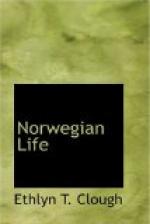Tegner had modernized his hero and heroine in Frithiof’s Saga. He gave them Viking garbs and surroundings, but modern thoughts and sentiments. By the more copious development of the inner life, and by placing woman on an equality with man, love had received a higher meaning, and his poetry unfolded inspirations unknown to the ancient world, such as melancholy and the love of nature. He did no more than Tennyson did later in making of King Arthur the type of an English gentleman. Frithiof and Ingeborg were representatives of the national ideal. The success of his poem was immense. It had a lyrical intensity which set the Scandinavian mind vibrating. Unmindful of the anachronism, youth gloried in the noble disinterestedness of Frithiof, in his generosity to his rival, his melancholy philosophising and his high-minded love, as well as in his daring and his love of adventure. Manly breasts heaved in sympathy with him, and women’s tears flowed at the story of Ingeborg’s love. As the poet Snolisky has said—
From the highest to the lowest throughout
the land
The poet had created a bond of union.
In every home, within every school door,
His verses were read and conned and loved,
And Sweden’s youth felt its cheek
glow
At Frithiof’s courage and manly
mood.
While Ingeborg’s love to the maiden’s
dream
Gave life and thoughts to her weaving
and sewing.
In his Children of the Lord’s Supper, so beautifully translated for us by Longfellow, Tegner conveyed a true image of Sweden’s religious life. The scene in the country church, decked out with flowers and evergreens for the solemn ceremony, the rustic boys and girls bowing and curtseying as they make their responses before the assembled congregation, and the attitude and words of the patriarchal pastor are all true to life. The somewhat declamatory tone of the oration is not less consistent with the character of the rural parson, the trend of Swedish religious thought, and the solemnity associated with these occasions.
It was in his patriotic war-songs, however, that Tegner roused the greatest enthusiasm. His Svea, his dithryambic declamation King Charles, and his Scanean Reserves, sent a thrill through young and old. When Svea was read at the Swedish Academy, which awarded the poem its gold medal, the friends and opponents of Tegner alike were moved to undisguised admiration. In breadth and intrinsic power, and in the beauty of its rythm, which seems to echo the clash of arms and the marching of masses, this poem is unequalled in Swedish literature. Tegner’s name soon became known far beyond the limits of the lands where his language is understood. His works were translated into almost all modern tongues, so that some fifty different translations of the whole or parts of his poems now exist in eleven European languages.




